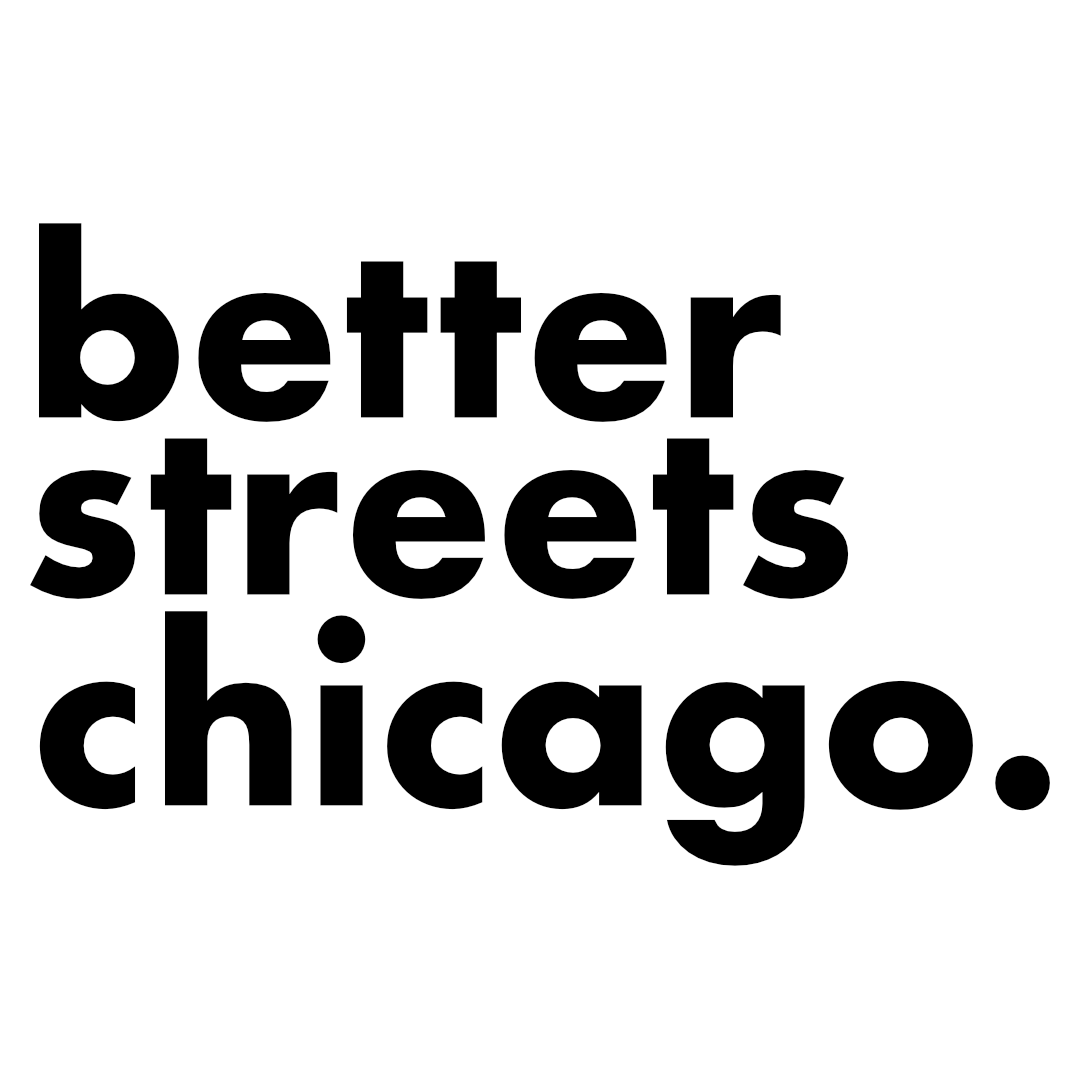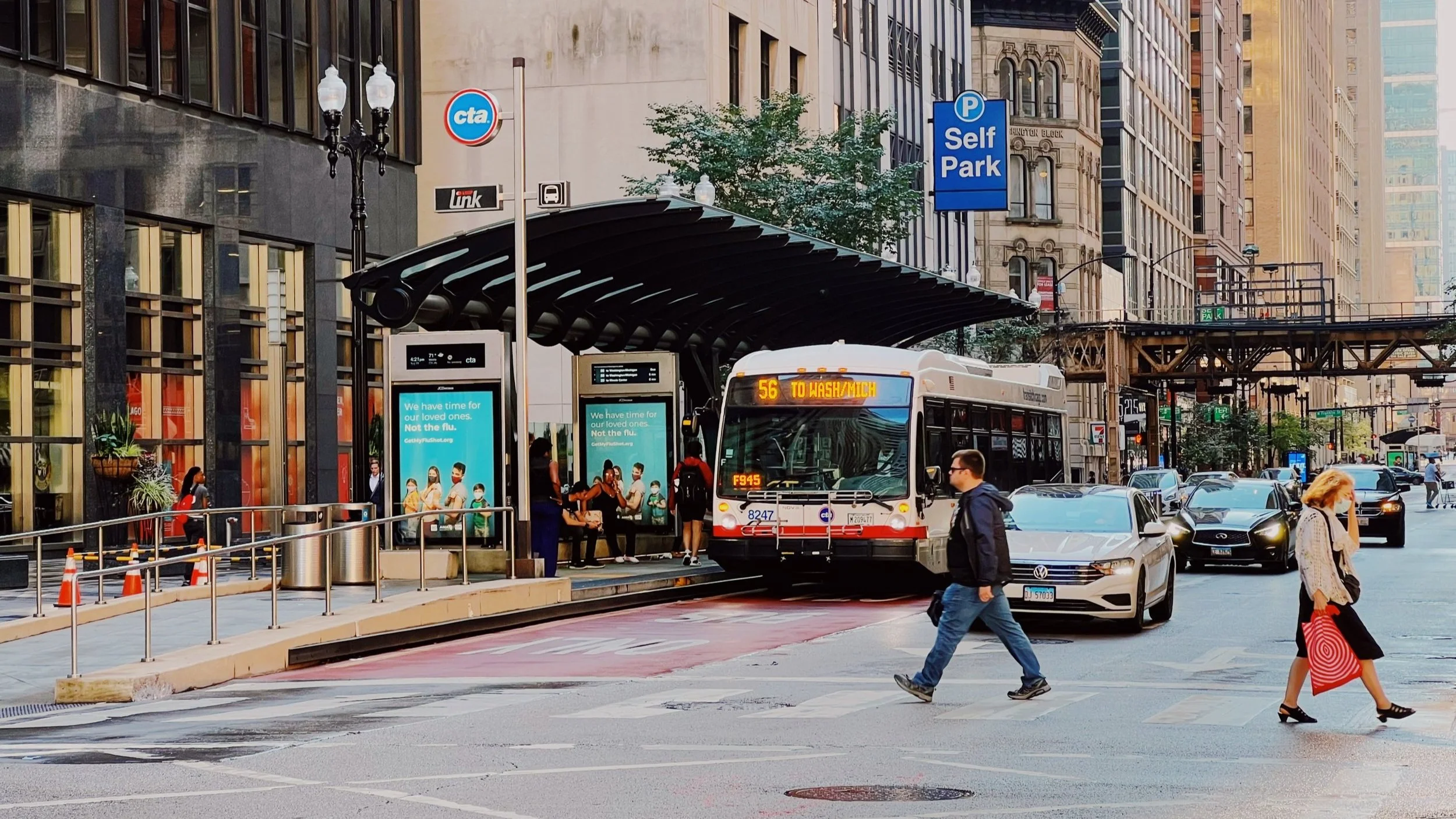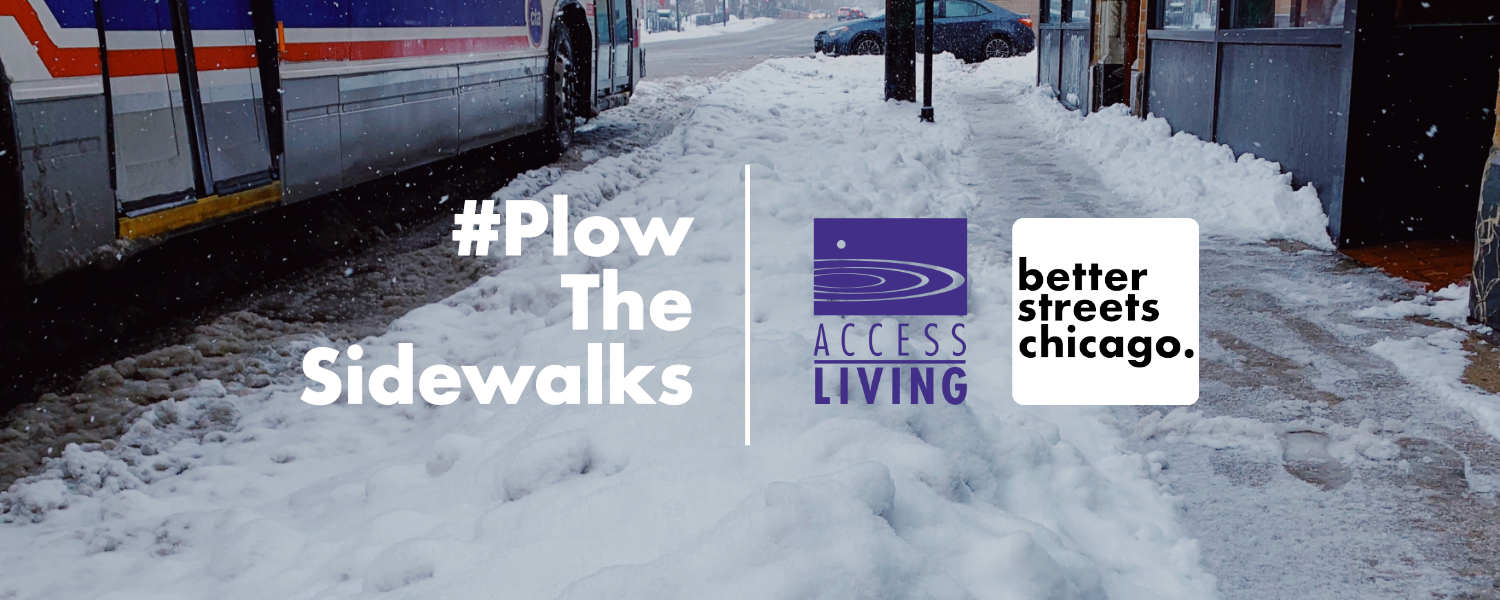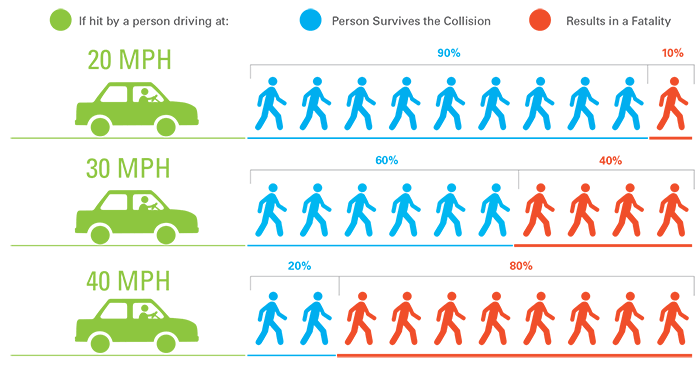Transportation advocates urge the Johnson administration to appoint a bold and visionary leader as Chicago Department of Transportation Commissioner
We urge Mayor Brandon Johnson to carefully consider his next appointment for CDOT Commissioner, as it will be one of his most consequential. Transportation touches every aspect of Chicagoans’ lives, and enacting transformational change to our streets will be a cornerstone to addressing many of our City’s challenges — from environmental, climate, racial and disability justice, to affordable housing, education, labor rights and beyond.
With the announcement of the resignation of Gia Biagi as Commissioner of the Chicago Department of Transportation, advocates are reflecting on the outgoing Commissioner’s tenure and the long road of advocacy that has brought us to this moment – as well as the road ahead.
Leading CDOT is a significant undertaking, and we thank Commissioner Biagi for choosing to serve over the past four years. Important strides were made under her leadership in beginning to center equitable investments in disinvested communities and to mend the often contentious relationship the Department has had with advocates and community members. We wish her well in her next chapter.
We urge Mayor Brandon Johnson to carefully consider his next appointment for CDOT Commissioner, as it will be one of his most consequential. Transportation touches every aspect of Chicagoans’ lives, and enacting transformational change to our streets will be a cornerstone to addressing many of our City’s challenges — from environmental, climate, racial and disability justice, to affordable housing, education, labor rights and beyond.
Chicago needs a CDOT Commissioner who will:
Lead with a spirit of compassion and collaboration. Community and advocate voices should be heard and uplifted. Interagency collaboration must be a focus: CDOT cannot enact the impactful change our City needs on its own.
Center people over the movement of private automobiles. For decades the scales have been tipped in one direction. It’s time to tip them back through safe and accessible infrastructure investments.
Be bold and empowered. Our problems are big, and so must be our solutions. Be willing to take risks, learn from peer cities – and adopt best practices for all communities.
Re-think Vision Zero. The program intended to reduce traffic fatalities to zero has instead achieved zero progress, with City data showing a 17% increase in fatalities since its introduction in 2017. It’s time for a different approach to eliminating traffic violence.
Commit to racial equity and mobility justice. CDOT must formalize a comprehensive, sincere, and unflinching commitment to racial equity and mobility justice in Chicago's transportation system to dismantle structural racism, remove racialized inequities, and improve life outcomes for racially marginalized communities.
This is a critical moment for our City. Pedestrian and cyclist deaths are at record highs. The CTA needs significant support from CDOT to upgrade and expand its system. Our climate crisis demands change, and we have entire communities with inadequate access to transit – or even sidewalks. Addressing these challenges will require bold, courageous, and visionary leadership from Mayor Johnson and his next-appointed CDOT Commissioner – and advocates stand ready to work alongside them.
Signed:
Better Streets Chicago
Access Living
Active Transportation Alliance
Chicago, Bike Grid Now!
Chicago Family Biking
Commuters Take Action
Environmental Law & Policy Center
The Equiticity Racial Equity Movement
Elevated Chicago
High Speed Rail Alliance
Metropolitan Planning Council
Northwest Center
Sierra Club Chicago
Shared-Use Mobility Center
The Southwest Collective
Urban Environmentalists Illinois
‘Chicago #PlowTheSidewalks Pilot Program’ Ordinance PASSES City Council Vote 49-1!
We’re so thrilled to share GREAT news: on Wednesday, July 19th the ‘Chicago Plow the Sidewalks Pilot Program’ ordinance PASSED in City Council 49-1!
This is a monumental moment for our city, and we couldn’t have done this without your support. Thank you for canvassing, emailing your alders, sharing on social media, participating in public comment, and beyond!
We’re so thrilled to share GREAT news: on Wednesday, July 19th the ‘Chicago Plow the Sidewalks Pilot Program’ ordinance PASSED in City Council 49-1!
This is a monumental moment for our city, and we couldn’t have done this without your support. Thank you for canvassing, emailing your alders, sharing on social media, participating in public comment, and beyond!
For those unaware of what this ordinance accomplishes: the City will be establishing a working group of relevant City departments (ie. Department of Streets and Sanitation, Department of Transportation, Mayor’s Office for People with Disabilities) to develop a plan for a pilot program. This working group will be appointed by Committee on Pedestrian and Traffic Safety Chair Daniel La Spata, and will consult with alders and community members no less than 3 times by May 31st. Their plan will be due to be presented before City Council by then for approval for implementation Winter 2024-25.
We’re so grateful for the tremendous leadership of Ald. Gilbert Villegas, for believing in us, and believing in this vision. We’re also so thankful for the collaboration of Committee on Pedestrian and Traffic Safety Chairman Daniel La Spata and Mayor Brandon Johnson, coming alongside us to get this ordinance over the finish line.
The work is far from over – but today we can all celebrate knowing we’re so much closer to plowing the sidewalks!
Speaking of celebrating, We would like to invite you for a casual happy hour Tuesday, July 25th at Off Color Brewing’s Mousetrap Taproom from 6-8pm! Feel free to come and go as you’re available, we’d love to connect with you and community members and celebrate this victory together! If you’d like to join us, you can rsvp here.
Community Groups and Organizations Urge City Council to vote ‘Yes’ on the ‘Chicago Plow the Sidewalks Pilot Program’ Ordinance
To the Chicago City Council
121 N La Salle St
Chicago, Illinois 60602
July 18, 2023
Dear Members of the Chicago City Council,
We, the undersigned, support the ‘Chicago Plow The Sidewalks Pilot Program’ ordinance. The consistent and timely removal of snow and ice from sidewalks and pedestrian routes should be a routine municipal service, just like they are for the streets. Plowing snow from sidewalks ensures the city’s entire transportation system is accessible and reliable year-round for all users – no matter the weather. Accessible sidewalks are critical to a functioning transportation system and the health and well-being of hundreds of thousands of Chicagoans, especially older residents, people with disabilities, families with children, and transit users. Sidewalk snow plowing is not a luxury – it is a necessity.
Depending on property owners, businesses, and private residents to shovel sidewalks is no longer an acceptable policy. The current policy results in haphazard clearance. It is difficult to enforce and this only occurs long after sidewalk conditions are reported – if they’re reported at all. Furthermore, the current policy asks residents to perform difficult and dangerous labor. People with disabilities and older adults who cannot or should not remove snow from their properties must pay for or rely on others for snow removal. If they can’t arrange—on their own—for snow removal, they may be hit with fines. The job just doesn’t get done.
Plowing sidewalks establishes parity between infrastructure and services for pedestrians, cyclists, and transit riders with drivers and road-users. And it guarantees everyone has access to the city’s economy, civic amenities, services, social life, transportation, and the outdoors. This includes almost 700,000 Chicagoans who have a mobility difficulty or vision impairment (including blindness), senior citizens, and households with small children. Consistently and reliably plowed sidewalks will also benefit postal and delivery workers, pet owners – and literally anyone who uses a sidewalk.
Municipal sidewalk snow plowing can be done city-wide. Annually, the City demonstrates that it can plow snow from roads. The example of cities like Toronto, Canada and Syracuse, NY show that snow plowing services can be applied to sidewalks just as easily. Toronto is the same size as Chicago, and over the years it has expanded snow plowing services into a coordinated service that includes roads, bike lanes, and sidewalks. There, sidewalks citywide can be plowed in as little as 13 hours and always within 72 hours of a snowfall.
The people of Chicago have shown they support this initiative, and they deserve a demonstration of what municipal sidewalk snow plowing looks like.
We urge you to vote “Yes” to pass the ‘Chicago Plow The Sidewalks Pilot Program’ ordinance, which will establish a working group to develop recommendations for carrying out a pilot. This is an opportunity for Chicago to introduce a critical new service that will benefit all residents while being life changing for hundreds of thousands. Taking this step will reaffirm Chicago’s position as a leader on disability equity and help make Chicago one of North America’s most accessible cities.
Sincerely,
Better Streets Chicago
Access Living
AARP Illinois
Active Transportation Alliance
AIDS Foundation Chicago
Chicago, Bike Grid Now!
Chicago Family Biking
Chicago Jobs with Justice
Commuters Take Action
Equiticity
Independent Drivers Guild of Illinois
Indivisible Lincoln Square
Metropolitan Planning Council
Northwest Center
Shared Use Mobility Center
Sierra Club Chicago
The Southwest Collective
Urban Environmentalists
Westside Justice Center
Community Groups and Organizations Call for Protected Bike Lanes on Lincoln Avenue
A group of community groups, organizations, and local businesses are calling for protected bike lanes to be implemented in the imminent Lincoln Avenue Streetscape and Plaza project, which calls for a variety of improvements to Lincoln Ave. between the Ainslie Arts Plaza (Western Ave.) and Catalpa Ave. in Lincoln Square. This is a crucial opportunity to significantly improve safety for cyclists and pedestrians as outlined in the 2019 Lincoln Square Master Plan, and we believe protected bike lanes must be a key component of the project along Lincoln.
While we are encouraged by the increasing amount of support Aldermen Vasquez (40th) and Martin (47th) have shown for improving Chicago’s pedestrian and bike infrastructure, we remain concerned that CDOT continues to exclude critical upgrades from this streetscape project’s final design. In a letter, we’ve outline our demands for this project and hope to reinforce their support for protected bike lanes on Lincoln by communicating to CDOT and IDOT what we expect of Chicago’s transportation infrastructure.
Residents have made their desire for improved bike infrastructure clear, and CDOT must become a proactive partner in that effort and honor calls from them to build protected bike lanes in the final plans for the Lincoln Avenue Streetscape Plan.
We are living through a series of crises, from cost-of-living and traffic violence, to congestion and the climate crisis. Building a network of protected bike lanes is essential to address these challenges, allowing more people to take advantage of low-cost transportation options, reducing congestion and emissions, and increasing safety by reducing the number of people who drive.
If your organization or business would like to add your name in support, email us at info@betterstreetschicago.org
Why Chicago must vote against raising the speeding ticket threshold
Here’s why we’re calling on City Council to vote against raising the speed threshold at which it issues speeding tickets.
On Wednesday, July 20, the Chicago City Council will vote on whether to raise the threshold at which speed cameras start issuing tickets to speeding drivers from 6 mph above the posted speed limit to 11 mph over.
While supporters of raising the ticketable speed threshold argue the City is making an unfair and inequitable money grab, the lower limit – and speed cameras generally – have proven an effective tool for reducing driving speeds and increasing road safety for all users. The benefits of speed cameras are clear, but many opponents are correct to call out ongoing challenges.
We hear and understand the arguments of many people who oppose the speed cameras. Many are right to raise questions about their deployment and the disproportionately negative impact fines can have on low-income and working class people, particularly in Black and Brown communities. We agree that the City should not be deploying traffic cameras as a means of raising revenue rather than focusing on public safety benefits, but we do not agree that the solution is to raise the threshold at which tickets begin being issued to speeding drivers.
Higher speeds result in a higher likelihood of death
It is well-established that two factors play a significant role in whether a traffic crash turns deadly:
The size and weight of a vehicle
The speed it is being driven
The bigger and heavier a vehicle is and the faster it is being driven significantly increases the likelihood that a pedestrian, cyclist, or other vehicle passengers will be seriously injured or killed upon impact.
The Institute of Transportation Engineers has visualized this point clearly with the chart below.
Image source: San Francisco MTA Vision Zero Action Plan, February 2015
The chart illustrates how fatalities increase at an exponential rate as speed increases:
Drivers are unlikely to cause a fatality to a pedestrian or cyclist when traveling at or below 20 mph.
Increasing driving speeds from 20 to 30 mph increases the rate of crash fatalities of pedestrians and cyclists from 10% to 40%.
Increasing speeds from 30 mph to 40 mph, the fatality rate jumps from 40% to 80%.
None of this takes into account serious injury rates or the impact on drivers hit by other reckless drivers.
Who the increased ticket threshold hurts most
Raising the ticketable threshold from 6 mph to 11 mph over the posted speed limit will encourage drivers to operate vehicles fatally fast on almost any Chicago street. The posted speed limit on most City streets is 30 mph, which is moderately dangerous as-is; raising the ticketable threshold in practice raises the speed limit to the dangerously high speed of 40 mph.
Inequities can also be found in who is most impacted by traffic crashes. Black Chicagoans are killed by traffic violence at a rate five times higher than White residents and three times higher than Hispanic residents, according to City data. This is further reflected by the fact that 60% of all traffic crash related emergency room visits are made by Black residents.
It is disappointing that the City Council is considering this change as the City is experiencing a significant increase in traffic violence including the recent deaths of six residents walking or biking, including four Chicago youth ages 2 to 16 killed this summer. This disappointment is compounded considering traffic enforcement cameras are shown to work. According to a study reported on by WBEZ, the number of tickets issued by speed cameras has reduced over time, although the average ticketed speed has remained consistently over 11 mph. ProPublica has reported traffic enforcement cameras reduced injurious or fatal crashes by 15%. Likewise, Streetsblog Chicago has reported extensively on safer behavior shown by most drivers near traffic cameras.
Why the City should not raise the current speeding ticket threshold
We call on the City Council to retain the current threshold of issuing speeding tickets at 6 mph above the posted limit.
We do not do this lightly: we are well aware of the negative impact the current system has on communities – especially low-income, working class, and/or Black and Brown communities. We also recognize that Black and Latinx residents statistically face a significantly higher risk of traffic fatalities.
In addition to retaining the current threshold, we call on the City Council, CDOT, and Mayor Lightfoot to make a number of corresponding changes to how traffic enforcement cameras are used and funds are allocated, focusing on reducing the inequities of the current model while implementing changes to the makeup of our streets.
We call on the City Council to enact the following:
Establish a lower city-wide speed limit.
Guarantee all revenue generated from traffic enforcement cameras is dedicated to funding infrastructure that improves traffic safety and user behavior in high infraction and crash corridors through design – including building a city-wide network of dedicated barrier-protected bike lanes and connecting off-street trails and on-street paths, widening sidewalks, street pedestrianization, transit expansion, transit prioritization, and road diets that reduce traffic speed.
Establish transparent and consistent guidelines to be codified by ordinance governing when and where traffic enforcement cameras are used and how they are added or removed. This includes universal deployment near schools, parks, and other defined areas of concern; establishing clear metrics to determine the success or failure of a camera in improving desired safety outcomes; outlining improvements communities can pursue that would result in cameras being removed.
Make fines for violators more equitable by scaling fines to reflect potential risk (i.e., higher fines for higher speeds and more dangerous vehicle models), scale fines and fees based on number of violations, issuing warnings for the first two violations (three strike rule), scaling fees based on income, capping late fees on unpaid tickets or eliminating them entirely for low-income residents.
Establish a municipal bike, walk, and transit fund that ensures a dedicated and consistent amount of money is spent on maintaining and expanding pedestrian, bike, and transit infrastructure and services.
Install speed recorders to better inform drivers of their speed in areas where cameras are used to provide fair opportunities to adhere to driving rules.
Many of these recommendations are based on or taken directly from a UIC study to understand the impact of speed cameras, which the City commissioned. The City Council, Mayor’s office, and CDOT should act on these recommendations instead of passing policies that will make our streets more dangerous.
Chicagoans are understandably fed up with taxes, fines, and fees. Despite them going up and being expanded, we rarely see any public benefits through improved services or infrastructure. It is time for the City Council, Mayor’s Office, and CDOT to step up and act as leaders on this issue. Speed cameras can and should play an important role in maintaining safe streets for all users, but this must be met with fundamental reforms and investments in redesigning our streets to prioritize people and safety first.
How your alderperson voted
We launched an email campaign in response to this vote, and because of the collective advocacy of those fighting for safe streets many alders flipped their projected votes and we were successful in defeating this ordinance. Below you can take a look at who that campaign reached and how they voted.





